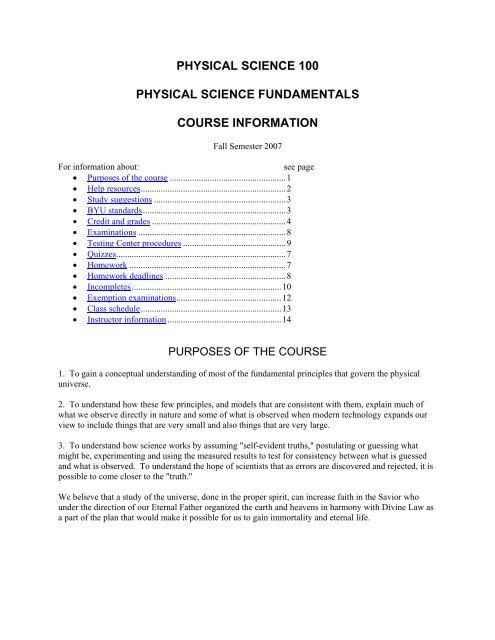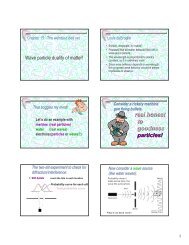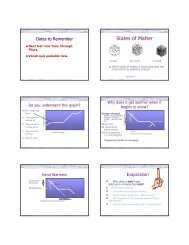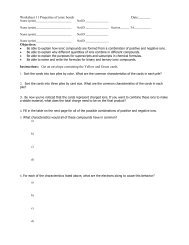physical science 100 physical science fundamentals course ...
physical science 100 physical science fundamentals course ...
physical science 100 physical science fundamentals course ...
You also want an ePaper? Increase the reach of your titles
YUMPU automatically turns print PDFs into web optimized ePapers that Google loves.
STUDY SUGGESTIONSSuccessful students in this <strong>course</strong> study each chapter in the following way:1. They read both the outline of the chapter in the Study Guide and the corresponding chaptermaterial before it is discussed in class. They read the Synthesis questions for the chapter verycarefully before coming to class.2. They listen carefully to the lecture demonstration discussions. They take very brief notes.They ask questions or record questions to ask later.3. They study the chapter carefully before the next class. They review the Comprehension andAnalysis Questions and write out answers to all of the Synthesis Questions in the Study Guide.4. They go to the TAs in N252 ESC or come to their instructor to review their answers to theSynthesis Questions and to ask questions.5. They review their graded exams with the TA’s so they will not repeat mistakes on the final.BYU STANDARDSHonor Code:We fully support the church program of which BYU is a part. It is our intention and commitment tosupport and uphold the honor system, the standards of dress and appearance, the highest level of personalintegrity, and all other University traditions, rules and guidelines. If you observe any actions on our partwhich you think are inconsistent with this commitment, please let us know in a forthright but confidentialway. We will treat you with the same courtesy.Sexual Harassment:Gender based discrimination and sexual harassment are against BYU policy and federal law. Thisextends not only to employees of the university but students as well. If you encounter unlawful sexualharassment or gender based discrimination, please talk to your professor, contact the Equal EmploymentOffice (422-5895), or the Honor Code Office (422-2847).3
COURSE REQUIREMENTS AND GRADESGeneral Education credit for the Physical Science (Arts and Science Core) requirement is given tostudents enrolled in Physical Science <strong>100</strong> who pass the <strong>course</strong> with a D- grade or better.In this <strong>course</strong> you receive points for a variety of different assignments, activities, and evaluations. Each isassigned a point value and is targeted to specific learning objectives. There are 400 points possible in the<strong>course</strong>. All points in this class are weighted equally. Grades are assigned based on the following work:In-class quizzes 2 points/lecture (60 points) Due DailyHomework 4 points each (80 points) Due weeklyVocabulary quizzes 5 points/quiz (20 points) Due monthlyExams 1-4 35 points/exam (140 points) Due monthlyFinal Exam<strong>100</strong> pointsWe will compute your overall letter grade, using the grading scale below, in two ways:1. Using only your score on the final exam.2. Using your score on the final exam plus the four midterm exams and all other work.Your grade will be the higher of the two.Note: The final exam is always included in your grade.Letter grade Total percent Minimum pointsA 90% or above 360 pointsA– 86-90% 344 pointsB+ 83-86% 332 pointsB 79-83% 316 pointsB– 75-79% 300 pointsC + 70-75% 280 pointsC 65-70% 260 pointsC– 60-65% 240 pointsD+ 56-60% 224 pointsD 53-56% 212 pointsD– 50-53% 200 pointsE Below 50%4
IN-CLASS ‘CLICKER’ QUIZZESDescription: For this class you should purchase a RF response device (clicker). During class you will berequired to answer questions about the assigned reading and lecture for that day. Reading is to becompleted before the class that covers each chapter. Most of these quizzes will be in-class interactivequizzes using the clicker you purchased at the beginning of the term. Your professor may occasionallyuse some online quizzes. If your teacher elects to use an online quiz, those quizzes can be found onblackboard.Purpose: It is important to read the material in the text before it is covered in class. These quizzesprovided added incentive for good study habits by giving you credit for doing your reading before class.Additionally they also provide your instructor with a quick way to judge whether the class has understoodan important point and is ready to move on.Format: Your teacher will typically intersperse numerous interactive questions into their lecturesthrough-out each class period. You will respond to these questions using your RF responder that youpurchase at the bookstore. Some of these questions will be graded for correct responses and some will begraded strictly on participation.Grading: Each quiz (one lecture’s questions) is worth 2 points on your final grade. All together theyrepresent approximately 15% of your final grade. Only 30 of these quizzes will be counted in your grade.Your lowest scores will be dropped to take care of any problems with your clicker or personalemergencies that prevent you from attending classes.Due Dates: Reading is to be done before class on the dates listed in the <strong>course</strong> reading schedule.Regardless of which class you attend, you are responsible to complete quizzes corresponding to the classfor which you registered. This means that if you choose to attend a different lecture, and that teacher doesnot have a quiz that day, but your section did have a quiz, you will loose the points for that quiz.Absolutely no extensions or late work will be allowed for quizzes.5
HOMEWORK QUESTIONS / GROUP WORKDescription: You must supply written answers to the assigned questions and experiments each week.Experiment worksheets are found on the <strong>course</strong> web page: http://ps<strong>100</strong>.byu.edu. These answers shouldbe discussed with your study group during the time allocated at the end of class. Occasionally, you willbe expected to turn in assignments as a group, but most assignments should be turned in individually.Each answer should be about ½ page long.Purpose: The questions are designed to require students to think through and apply the main concepts ofthe chapters and discuss these concepts with other students. These assignments will give you anopportunity to apply some of the more difficult concepts and receive feedback from TAs in lab before youare tested on the material.Format: The answer to each question is to be written or typed on an 8½”x11" piece paper with thesection and TA’s name, along with your name and ID# on top of the page. Do NOT email assignments. Ifyou have obtained permission to work with students outside your own section, you are responsible tomake sure that your TA receives a copy of your work. Make sure you indicate your section number andyour TA’s name, otherwise you may not receive credit for your work.Grading: Homework questions will be graded on a 4 point scale. You will be graded primarily on thecorrectness and completeness of your answers. Neatness, grammar and spelling will not be explicitlyconsidered, but they can affect your grade. Graded questions can be picked up in your recitation sectionsor in the walk-in TA lab.Due Dates: You must turn your homework in to your TAs box by the deadlines listed below. In general,students with labs on Monday and Tuesday must turn their homework in by 5:00PM on Wednesday.Students with labs on Wednesday-Friday must turn their homework in by 3:00PM on Friday. No latework is accepted. We will drop the 4 lowest scores. If you find yourself in a situation that you feelwarrants special consideration, please discuss this with your instructor and TA.6
Due Dates:Mon. & Tues. labs: due 5:00PM Wed.Wed., Thur., & Fri. labs: due 3:00PM Fri.Week 1week 2due Sep. 12 & 14week 3due Sep. 19 & 21Orientation and packet worksheet 1(Tues. Labs) Orientation and packet worksheet 1Orientation and packet worksheet 1(Mondaylabs)Chapter 2: worksheet 2: Weight and ContactforceChapter 3: Analysis Question 10Chapter 4: worksheet 3: Electric Force andChargeChapter 6: Synthesis Question 5Chapter 2: worksheet 2: Weight and ContactforceChapter 3: Analysis Question 10Chapter 4: worksheet 3: Electric Force andChargeChapter 6: Synthesis Question 5week 4Sep. 26 & 28week 5due Oct. 3 & 5week 6due Oct. 10 & 12Chapter 7: Synthesis Question 2Chapter 9: worksheet 4: Conservation LawsNo LabChapter 10: worksheet 5: wave behaviorChapter 11: worksheet 6: photoelectric effectChapter 12: worksheet 7: Hand WarmersChapter 7: Synthesis Question 2Chapter 8 & 9: worksheet 4: Conservation LawsChapter 10: worksheet 5: wave behaviorChapter 11: worksheet 6: photoelectric effectChapter 12: worksheet 7: Hand WarmersChapter 13: Synthesis Question 3week 7Oct. 17 & 19week 8due Oct. 24 & 26Chapter 13: Synthesis Question 3 Chapter 14: Analysis Questions 6 and 7Chapter 17: Synthesis Question 7Chapter 14: Analysis Questions 6 and 7Chapter 17: Synthesis Question 7Chapter 18: Synthesis Question 8week 9due Oct. 31 &Nov. 2week 10due Nov. 7 & 9week 11due Nov. 14 & 16Week 12week 13due Nov. 28 & 30week 14due Dec. 5 & 7Week 15due Dec. 12Chapter 18: Synthesis Question 8Chapter 19: worksheet 8: Mass and IRSpectrometryChapter 21: worksheet 9: Activation EnergiesChapter 22: worksheet 10: Intermolecular forcesChapter 24: worksheet 11: Bond characteristicsChapter 25: Synthesis Question 11Thanksgiving Holiday, No LabChapter 26: worksheet 12: Relative DatingChapter 28: Synthesis Question 2Chapter 30: worksheet 13: Geologic Causes ofNatural DisastersChapter 31: Synthesis Question 3Planetarium sessions start FridayChapter 33 PlanetariumCheck schedule for times. Bring Clicker.Chapter 20: worksheet 8: Mass and IRSpectrometryChapter 21: worksheet 9: Activation EnergiesChapter 22: worksheet 10: Intermolecular forcesChapter 24: worksheet 11: Bond characteristicsChapter 25: Synthesis Question 11Thanksgiving Holiday, No LabChapter 26: worksheet 12: Relative DatingChapter 28: Synthesis Question 2Chapter 30: worksheet 13: Geologic Causes ofNatural DisastersChapter 31: Synthesis Question 3Planetarium sessions start Friday.Chapter 33: PlanetariumCheck schedule for times. Bring Clicker.7
VOCABULARY QUIZZESDescription: The vocabulary quizzes are 25 question, online quizzes designed to test your recall of basic<strong>science</strong> facts. The questions are taken primarily from the vocabulary terms and fundamental laws foundin the Study Guide at the end of each chapter in the text.Purpose: These quizzes are intended to evaluate rote memorization of basic laws, terms, and facts. Thesequizzes evaluate the lowest level of understanding. They are not practice tests indicative of how you willbe evaluated on the midterms, but it is important to master the information on these quizzes before youtake the midterms. Without a mastery of the basic vocabulary of the <strong>course</strong>, it is impossible to thinkcritically and apply key concepts on the mid-term exams.Format: The vocabulary quizzes are available online through blackboard. You may retake the test asmany times as you wish before the test deadline. You will receive you last score. While this test is notproctored, it is still an exam, and you are on your honor to abide by the rules below.Vocabulary quizzes are closed book and closed notes. You are not allowed aids of any kindwhile you are taking the vocabulary quizzes, with the exception of a foreign language dictionaryfor those whose native language is not English. You may study for the quiz however you please,including printing a copy and going over it with friends, but you must take it alone without yourbook, notes, etc.Grading: Each test is worth a total of 5 points. You will receive the score on your last attempt.8
Exam ScheduleEXAMINATIONSExam Chapters Vocab. deadline Midterm Deadline Late Deadline1 1 - 9 Sat. Sep. 29 11:00AM Mon. Oct. 1 Oct. 22 10 - 17 Tues. Oct 21 11:00AM Wed. Oct. 24 Thurs. Oct. 253 18 - 25 Thurs. Nov. 15 11:00AM Fri. Nov. 16 Mon. Nov. 194 26 - 34 Tues. Dec. 11 11:00AM Wed. Dec. 12 Thurs. Dec. 13REQUIREDFINAL1 - 34 Fri. Dec. 21 NONEFinal examDescription: The final exam is <strong>100</strong> multiple choice questions, 25 from each unit. The questions aresimilar to those found on the midterm exams. The final is a minimum of 25% of your grade.Midterm examsDescription: The midterm exams are 30 question multiple choice questions and your choice of one outof four essay questions. The exams are designed to test your ability to apply <strong>science</strong> concepts. Themidterm exams contain paragraphs describing situations followed by one or more questions requiring youto use your knowledge of <strong>science</strong> to analyze the situation.Purpose: These tests are intended to evaluate your knowledge and understanding of the <strong>course</strong> material.If you have reason to believe that a multiple choice test will not provide an accurate measure of yourunderstanding, please discuss this with your instructor at the beginning of the semester.Format: Exams will be taken in the Testing Center (Grant Building) on or before the dates listed above.The deadlines are the last day you can take the test. They will be available for at least 2 days before thedeadline. All exams are subject to the following rules.1. All exams will be closed book and closed notes. You are not allowed aids of any kind, withthe exception of a foreign language dictionary for those whose native language is not English. APeriodic Chart, a list of elements, and various tables and figures will be provided.2. You will need a pencil and a picture I.D. (preferably your BYU ID card) to take the exams.3. The exam questions are confidential and are not to be discussed with anyone, other thanthe class instructors or assistants, at any time.You may review a copy of the exam with a teaching assistant in N252 ESC before the next exam. Thedeadlines for reviewing exams 1, 2, and 3 are the same as the deadlines for taking exams 2, 3, and 4,respectively. Exam 4 may only be reviewed on the last day of the semester or term.Grading: Multiple choice questions are worth 1 point each. There is no penalty for guessing. Onmidterms, you will be able to choose among several essay questions and answer one. An essay questionis worth 5 points.9
Testing Center ProceduresHoursDay Open Last test distributed ClosedMon. 10:00 AM 9:00 PM 10:00 PMTues 8:00 AM 9:00 PM 10:00 PMWed.-Thurs. 8:00 AM 9:00 PM 10:00 PMFri. 8:00 AM 9:00 PM 10:00 PMSat. 10:00 AM 3:00 PM 4:00 PMGeneral InformationThe deadline to pick up a test weekdays is 9:00 pm, you then have until 10:00 pm to finish the exam.This means that a student who gets to the Testing Center line at 9:01 pm on the last day of test 2 will notbe allowed to take the test. The Testing Center is generally crowded during afternoon hours on examdeadline dates. You will find morning hours less crowded.10
I’sAn I (Incomplete) is given by arrangement with your professor. An I is only given when extenuatingcircumstances (serious illness, death in the immediate family, etc.) occur after the twelfth week of asemester, or sixth week of a term. In case of such extenuating circumstances prior to this, you shouldapply directly to the Registration office, B-130 ASB, to officially withdraw from the class. An I is nevergiven when you are failing or have failed the <strong>course</strong>.If you think you qualify for an I, please contact your instructor. There is a $10.00 fee for an I. An I isnot counted as a failing grade in your grade point average until four months after you receive it.Thereafter, it becomes a failing grade in your grade point average until it is cleared.11
EXEMPTION EXAMINATIONSIt is possible to satisfy the university <strong>physical</strong> <strong>science</strong> requirement by taking and passing an exemptionexam. The exemption exam for this <strong>course</strong> is the equivalent of a final exam. It is comprehensive andconsists of <strong>100</strong> multiple-choice questions on physics, chemistry, astronomy and geology. Taking theExemption Exam will not hurt your grade. If you do well on the Exemption Exam, you have severaldifferent options depending on your grade on the exam. The exam is offered in the Testing Center fromSep. 6-17.GradeOption60%-<strong>100</strong>% 1. If you are enrolled in the class you can stay enrolled and do nothing. Your gradeon the exemption exam will be used as your grade on the class final, and hence, yourgrade in the class.2. If you are enrolled in the class, you can stay enrolled and take the final during thefinal exam period to try to improve on your score. Your grade in the class will be thehigher of the two grades.3. If you are enrolled in the class, you can stay enrolled and take the class, completingall assignments and tests. Your grade in the class will be the highest of 3 grades: yourgrade on the exemption exam, your grade on the final, or your grade on all completedwork including the final.4. If you are enrolled in the class you can drop the class and fill out a blue credit format the Testing Center and pay the fee to have the appropriate letter grade posted onyour transcript. You will receive a grade and GE credit without staying enrolled in theclass and paying tuition for it. However, credit received in this manner does not countfor the purposes of financial aid, scholarships, or full time status.75%-<strong>100</strong>% 5. If you are enrolled in the class you can drop the class. You will have a waiverposted on your transcript without having the grade posted or receiving the credits.(The option of having the grade posted and getting credit is still opened to you. See 4.above.) YOU MUST DROP THE CLASS IF YOU DO NOT WANT THE GRADEPOSTED.The exact letter grade is determined by the scale given on page 4. Any score below 60% is notconsidered a passing grade on the exemption exam, and you must take the class to receive credit.12
FALL 2007 CLASS AND EXAMINATION SCHEDULESep 5 W Knowledge, Science & universe Chapter 17 F Laws Governing Motion Chapter 210 M The Gravitational Interaction Chapter 312 W The Electromagnetic Interaction Chapter 414 F Applications Chapter 517 M Forces in Fluids Chapter 619 W Motion at High Speed Chapter 721 F Conservation Laws Chapter 824 M Energy Chapter 926 W Special Topics28 F ReviewDeadline 1 M Test 1 deadline 11:00AMOct. 1 M Waves Chapter 10Late Deadline 2 T Test 1 Late deadline3 W Properties of Light Chapter 115 F Physical Properties of Matter Chapter 128 M Molecular Model of Matter Chapter 1310 W Later Models of Matter Chapter 1412 F Duality of Matter Chapter 1515 M Wave Model of the Atom Chapter 1617 W The Periodic Table Chapter 1719 F Special Topics22 M ReviewDeadline 24 W Test 2 Deadline 11:00AM24 W Law of Increasing Disorder Chapter 18Late Deadline 25 Th Test 2 Late Deadline26 F Elements and Compounds Chapter 1929 M Principles of Chemical Reactivity Chapter 2031 W Bonding in Metals Chapter 21Nov 2 F Bonding in Ionic Compounds Chapter 225 M Bonding in Covalent Compounds Chapter 237 W Applications Chapter 249 F Nuclear Processes Chapter 2512 M Special Topics14 W ReviewDeadline 16 F Test 3 Deadline 11:00AM16 F Geologic Time Chapter 26Late Deadline 19 M Test 3 Late Deadline19 M Planet Earth Chapter 2720 T The Interior of the Earth Chapter 28W,F HOLIDAY26 M From Continental Drift Chapter 2928 W Plate Tectonics Chapter 3030 F The Changing Face of the Earth Chapter 31Dec 3 M Beyond the Earth Chapter 325 W The History of a Star Chapter 337 F Cosmology Chapter 3410 M Special TopicsDeadline 12 W Test 4 Deadline 11:00AM12 W Review13 Th TEST 4 Late deadline21 Final exam deadline13
FACULTY-FALL SEMESTER 2007Section Time Faculty1-8 8:00 MWF W. Anderson9-12 9:00 MWF R. Skinner13-21 10:00 MWF M. Ware22-30 11:00 MWF B. Kowallis31-39 12:00 MWF E. Hirschmann40-48 1:00 MWF E. Hirschmann49-55 2:00 MWF J. Boerio-GoatesOn Line 3:00 M S. BergesonNight 6:00 T T. StephensFaculty Office PhoneAnderson C106 BNSN 422-5818Boerio-Goates C311A BNSN 422-2302Bergeson N267 ESC 422-6161Hirschmann N219 ESC 422-9271Skinner S385ESC 422-6083Kowallis S341 ESC 422-2467StephensWare 422-218614






